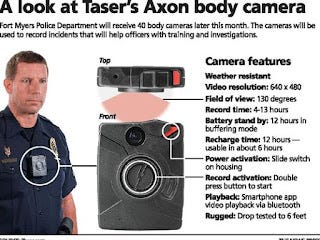Boston Police body cams cost taxpayers $3 million a year, while cops receive $500 each to wear them (Updated)

image credit: News-Press
According to a Boston Globe article, cops must volunteer to wear body cams. Camera proponents are concerned that the program will be voluntary.
Boston Mayor claims police body cams don't build trust
“It really hasn’t been shown to even build trust in the community,” Mayor Martin Walsh said.
He's technically right, most states don't allow the public to see police body cam footage. For more info. read "State Laws Restrict Release Of Police Body Cam Footage."
Police body cams cost taxpayers $3 million a year
Taser International (TI) charges police $400-$600 for a single body cam and also charges police departments $15 a month per officer or $89 per month per officer to store the data on their cloud. Police across the country are using taxpayer dollars to lease TI's Axon Body 2 cameras.
If you include the storage fees and the price of body cams to equip a police force the size of Boston's which has close to 2,700 cops. The total is much more than $3 million.
Taser's police body cams designed to ward of lawsuits against the company
Taser initially turned to cameras as a way to ward off lawsuits, both for the company and the police. “It was about defending our business,” Rick Smith, Taser’s chief executive officer said.
Taser has a close relationship with DHS
Back in 2004, former NYPD Commissioner Bernard Kerik was President Bush's choice to head DHS. Fyi, Mr. Kerik made $6.2 million by exercising stock options he received from Tl he was also on TI's Board of Directors. In 2009, Mr. Kerik went to jail for conspiracy and fraud.
Click here, here & here to find out more about TI's close relationship with DHS.
At Taser, its all about profits
This past May, TI hosted 'Analyst and Investor Day' on Wall St., TI has even created an 'Investor Relations' website.
Below, are two excerpts taken from page 27 of TI's 2014 annual report
Taser has a close relationship with the US military
Further develop our presence in federal government and military markets. We intend to continue to place emphasis on supporting our military customers through our team of professionals with extensive military, homeland defense and law enforcement experience.
Taser plans to monopolize the body cam market
“Taser wants to be the Tesla or Apple of law enforcement,” says Hadi Partovi, a venture capitalist who sits on the board. There are early signs the effort is working. In the first quarter of 2016, for the first time, Taser’s bookings for future revenue from the cameras and cloud services, $52 million, surpassed revenue from weapons sales.
For more information click here.
DHS is devoted to helping cops receive grants for military weapons, Tasers etc.
DHS has created, the 'Lessons Learned Information Sharing' (LLIS) program which is devoted to helping cops receive grants for military weapons, Tasers and much more.
Grant Case Studies: Case studies demonstrate how states and urban areas across the country use Federal homeland security grants to improve preparedness. These documents can be found here.
DHS, has even created a grant training program for cops, called First Responder Grants & Training.
Police Grants Help, is another website devoted to helping police write grants, to acquire military weapons, Tasers etc.Grants are a great way for your department to receive funding beyond the limits of your operational budget. They can help bridge the gap between your department’s resources and its needs. Grants are meant to be a solution to evolving community problems when budgets aren’t able to adjust quickly enough. Grants can help pay for equipment, vehicles, training, or even provide funding for additional personnel.There are many grant opportunities which will allow the cost of these cameras. For federal and state grants the use and purchase of body-worn cameras must be built into a program or policing strategy...
DHS develops police policy and doctrine
DHS's, 'Lessons Learned Information Sharing' (LLIS) program is part of FEMA’s National Preparedness Assessment Division (NPAD).
The LLIS program's mission:
In other words, DHS develops police policy and doctrine.
Each cop to be paid $500 to wear a body cam
What they're really saying is, cops will be paid an extra $500 in taxpayer dollars to voluntarily wear body cams.
Updated 8/23:
Cincinnati cops want to be paid extra to wear body cams
Police union everywhere are demanding cops get paid to wear body cams... "You want us to wear something new, it needs to be collectively bargained. The responsibility should increase our compensation" Fraternal Order of Police Lodge #69 President Dan Hils said .
According to the USA Today article, body camera pay would come in addition to any raise officers would get.
The city signed a seven-year agreement with TASER. Over that time, the equipment could cost taxpayers up to $6 million. By the end of this year 700 officers are expected to be wearing cameras.
Citizens to be recorded without their consent
Under the policy, people involved in the encounters don’t have to consent to being recorded, except in certain situations. For example, if an officer enters a home without a warrant, the occupant would have to be notified that they are being recorded and would have to agree.
Body cams will live stream faces to their database
An officer could patrol the Las Vegas Strip with a camera streaming to the cloud, “and there is real-time analysis, and then in my earpiece there is, ‘Hey, that guy you just passed 20 feet ago has an outstanding warrant.’ Wow” Lieutenant Dan Zehnder said.
Cops to review body cam footage before testifying
According to the Boston Globe, officers would have access to body cam footage prior to giving a statement for an internal investigation; and to prepare for court.
In other words cops won't be relying on memory, they'll be allowed to review their body cam footage before giving testimony.


